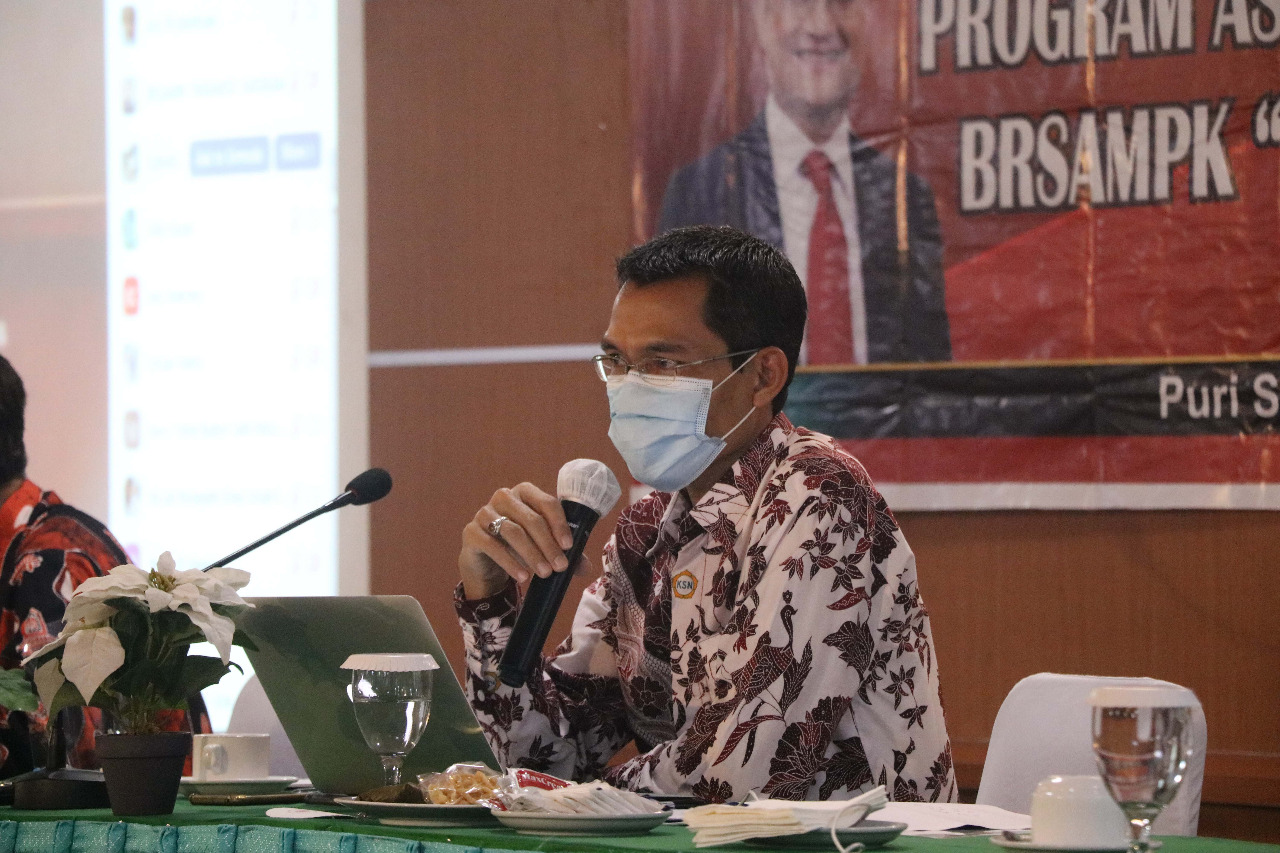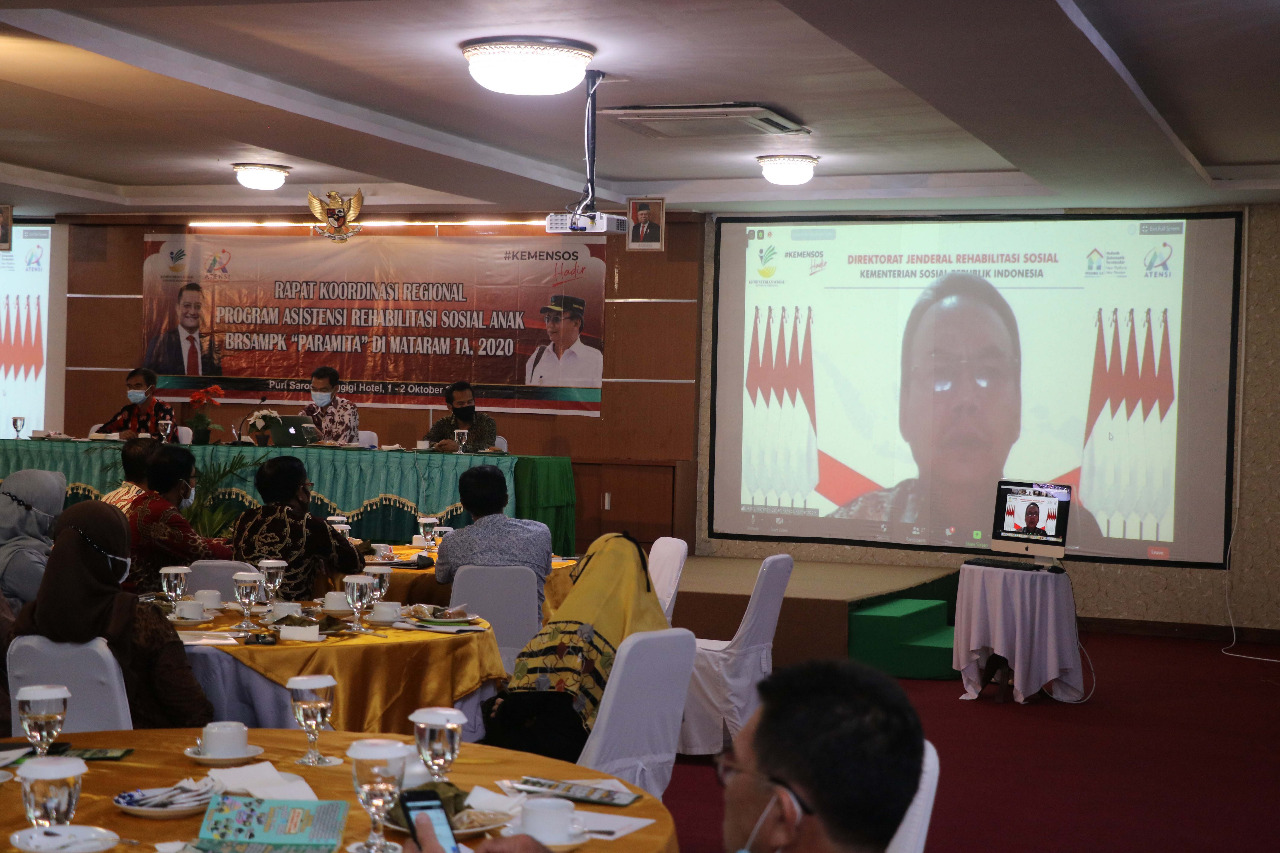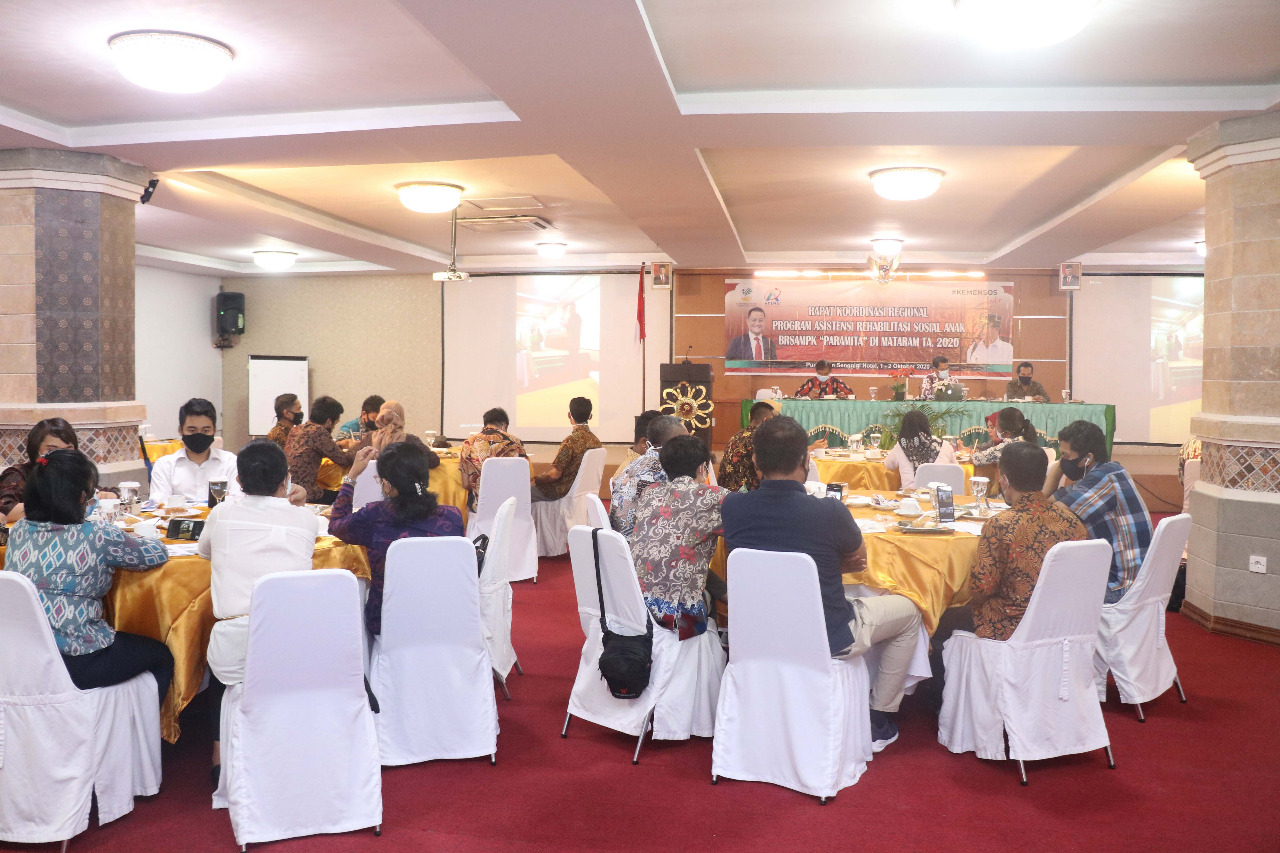Writer :
Humas "Paramita" Mataram
Editor :
Annisa YH
Translator :
Intan Qonita N
JAKARTA (October 1, 2020) - The Director General of Social Rehabilitation of the Indonesian Ministry of Social Affairs, Harry Hikmat, gave directions at the Regional Coordination Meeting for the Children's Social Rehabilitation Assistance Program of "Paramita" Social Rehabilitation Center for Children in Need of Special Protection (BRSAMPK) in Mataram virtually.
"The Ministry of Social Affairs through the Directorate General of Social Rehabilitation needs to update the development of the situation of Children in Need of Special Protection (AMPK) and ensure that the response to protection for AMPK is in accordance with the direction of policies and strategies that are continuously developed by the Ministry of Social Affairs," said Harry Hikmat.
This forum is one of the socialization media for various policy adjustments, strategies and programs, especially through the Social Rehabilitation Assistance (ATENSI), which will rely heavily on the performance of the Child Social Rehabilitation Center. Balai has a very strong mandate to implement ATENSI with full support from the Directorate of Child Social Rehabilitation (RSA).
Harry said that based on data (DTKS) there were around 27.4 million children who needed special attention out of a total of 75.04 million people. The Ministry of Social Affairs has taken strategic steps to ensure that data on children who need social services can be recorded and registered.
The RSA Directorate has communicated, coordinated, synchronized and synergized to ensure that children's data through the Child Welfare Institution (LKSA) is registered. Through the Social Welfare Integrated Data system (DTKS) with the addition of the DTKS-PPKS Child module, to date nearly 5.000 LKSAs have been registered and the data for children is around 183.000.
Based on the type of problem, a number of categories were identified, namely Children Needing Special Protection (AMPK), Children needing Social Function Development, Street Children, Children in Conflict with the Law (ABH), Toddler Children (from poor families, discarded, undocumented, in need of replacement families) and Homeless child.
"The Ministry of Social Affairs through the Directorate General of Social Rehabilitation needs to update the development of the situation of Children in Need of Special Protection (AMPK) and ensure that the response to protection for AMPK is in accordance with the direction of policies and strategies that are continuously developed by the Ministry of Social Affairs," said Harry Hikmat.
This forum is one of the socialization media for various policy adjustments, strategies and programs, especially through the Social Rehabilitation Assistance (ATENSI), which will rely heavily on the performance of the Child Social Rehabilitation Center. Balai has a very strong mandate to implement ATENSI with full support from the Directorate of Child Social Rehabilitation (RSA).
Harry said that based on data (DTKS) there were around 27.4 million children who needed special attention out of a total of 75.04 million people. The Ministry of Social Affairs has taken strategic steps to ensure that data on children who need social services can be recorded and registered.
The RSA Directorate has communicated, coordinated, synchronized and synergized to ensure that children's data through the Child Welfare Institution (LKSA) is registered. Through the Social Welfare Integrated Data system (DTKS) with the addition of the DTKS-PPKS Child module, to date nearly 5.000 LKSAs have been registered and the data for children is around 183.000.
Based on the type of problem, a number of categories were identified, namely Children Needing Special Protection (AMPK), Children needing Social Function Development, Street Children, Children in Conflict with the Law (ABH), Toddler Children (from poor families, discarded, undocumented, in need of replacement families) and Homeless child.
“This Children's Data needs to be updated, especially in the areas covered by the "Paramita" Center. Immediately make sure LKSAs in the Balai's coverage area for self-registration, self-registration, self-reporting, self-entry to the DTKS-PPKSA system which is integrated in the Social Welfare Information System of the Ministry of Social Affairs Pusdatin," said Harry. The state is obliged to register children who need special protection and strive to reach all child data.
"Events that occurred on children, such as Children in Conflict with the Law (ABH), victims of sexual crimes, victims of abuse, victims of trafficking and others, how this did not happen, did not increase," said Harry. Therefore, it is important to make efforts that are preventive in nature as well as to strengthen vulnerable, poor, underprivileged families whose children have the potential to experience problems of exploitation, violence, abuse, discrimination and various other problems.
Harry stated that poverty is still a driving factor or the problems that afflict children. This should be discussed in more detail at the coordination meeting. “Efforts to prevent Balai are not primarily curative and rehabilitative. Case response with a professional social work approach is still required. However, no less important is the effort to strengthen family (family support)," said Harry.
For example, the Family Hope Program (PKH), Non-Cash Food Assistance (BPNT), basic food assistance and other social assistance aims to prevent or prevent social problems. If the family does not have the ability to meet basic needs, do not get assistance, they may do things that are not expected in difficult situations (children who need special protection).
"Massive prevention efforts, including public awareness, campaigns to prevent children from becoming victims of exploitation, violence, neglect, mistreatment, dealing with the law, we need to do this intensively," said Harry. With these situations and conditions, the direction of the social rehabilitation policy will be readjusted.
“The vision of social rehabilitation will be transformed, that social rehabilitation is a function of social services, not just social assistance. Therein lies the importance of Child Social Rehabilitation Assistance," said Harry. Orientation to social services. In social services as a whole, there is indeed social assistance that is directed to the vulnerable, poor and very poor segments of the group.
"Events that occurred on children, such as Children in Conflict with the Law (ABH), victims of sexual crimes, victims of abuse, victims of trafficking and others, how this did not happen, did not increase," said Harry. Therefore, it is important to make efforts that are preventive in nature as well as to strengthen vulnerable, poor, underprivileged families whose children have the potential to experience problems of exploitation, violence, abuse, discrimination and various other problems.
Harry stated that poverty is still a driving factor or the problems that afflict children. This should be discussed in more detail at the coordination meeting. “Efforts to prevent Balai are not primarily curative and rehabilitative. Case response with a professional social work approach is still required. However, no less important is the effort to strengthen family (family support)," said Harry.
For example, the Family Hope Program (PKH), Non-Cash Food Assistance (BPNT), basic food assistance and other social assistance aims to prevent or prevent social problems. If the family does not have the ability to meet basic needs, do not get assistance, they may do things that are not expected in difficult situations (children who need special protection).
"Massive prevention efforts, including public awareness, campaigns to prevent children from becoming victims of exploitation, violence, neglect, mistreatment, dealing with the law, we need to do this intensively," said Harry. With these situations and conditions, the direction of the social rehabilitation policy will be readjusted.
“The vision of social rehabilitation will be transformed, that social rehabilitation is a function of social services, not just social assistance. Therein lies the importance of Child Social Rehabilitation Assistance," said Harry. Orientation to social services. In social services as a whole, there is indeed social assistance that is directed to the vulnerable, poor and very poor segments of the group.
The essence of child Social Rehabilitation Assistance (ATENSI), which is in the form of social services, fulfill the needs of social services from the poorest to the middle and upper income groups. This orientation applies to social security strategies, which include everyone. When it comes to children, it is not only limited to children from poor families, although it remains a priority scale. Children generally need social rehabilitation assistance. For example, children who are victims of trafficking, could be from the upper middle class.
"When it comes to social rehabilitation, it is not limited to reaching vulnerable and poor families, but society in general requires social rehabilitation services when experiencing social dysfunction," said Harry. Because the reach is quite broad, cohesiveness, reaching more broadly and inclusively becomes very important. These efforts are carried out in a professional and standardized manner, as well as intense efforts that are preventive in nature. The roles and responsibilities of families and communities are important, because if they only rely on institutional/residential services, the Center's ability to provide services and their gab needs is very inadequate.
According to Harry, a new strategy is needed to encourage Centers within the RSA Directorate to reorient themselves by conducting various direct interventions within the family. When the family is seen as still capable of carrying out its roles and responsibilities, it helps to solve the problems experienced by the child. Centers can involve LKSAs such as orphanages, local government homes, community homes, regional LPAs, youth associations, children, to be able to contribute to social services and even prevention.
"When it comes to social rehabilitation, it is not limited to reaching vulnerable and poor families, but society in general requires social rehabilitation services when experiencing social dysfunction," said Harry. Because the reach is quite broad, cohesiveness, reaching more broadly and inclusively becomes very important. These efforts are carried out in a professional and standardized manner, as well as intense efforts that are preventive in nature. The roles and responsibilities of families and communities are important, because if they only rely on institutional/residential services, the Center's ability to provide services and their gab needs is very inadequate.
According to Harry, a new strategy is needed to encourage Centers within the RSA Directorate to reorient themselves by conducting various direct interventions within the family. When the family is seen as still capable of carrying out its roles and responsibilities, it helps to solve the problems experienced by the child. Centers can involve LKSAs such as orphanages, local government homes, community homes, regional LPAs, youth associations, children, to be able to contribute to social services and even prevention.
“Family and community-based strategies are our focus in the future with the service center in Balai. Optimize the existence of these institutions to provide services to children and youth widely, not constrained by certain criteria. And it is possible to carry out temporary services, even to carry out early interventions so that existing problems do not develop and become more severe cases," said Harry.
Existing institutions including Centerbecome centers of service to families and community empowerment. The function of the institution is not only to "take care" of the children in the Center, but also to ensure that the children can again receive care and protection from their parents or family or relatives.
“The function of social services in the form of ATENSI is aimed at the recovery and development of social functions. This is something that can be shown to the public how special ATENSI is," said Harry. On that basis, the technical policy direction refers to respect, fulfillment of basic rights and child protection. Furthermore, strengthening the integrated social rehabilitation system with social security, social empowerment and social protection for children and families, expanding the reach of family, community and residential-based social rehabilitation for children. Then, strengthening the capacity and institutions of the Social Rehabilitation Center and LKS in the field of child and family protection, prevention must be strengthened, the role of the community and the private sector in social services for children and families is increased.
“And it was given a new branding, namely Social Rehabilitation Assistance, abbreviated as ATENSI. The form of various activities, ranging from fulfilling the needs of a decent living, child care, family support, physical therapy, psychosocial therapy, mental spiritual therapy, vocational training, entrepreneurship, even assistance is possible as well as accessibility support for children with disabilities," said Harry. ATENSI is a social rehabilitation service that uses a family, community, and/or residential based approach.
“When talking about a family-based approach, the issue of AMPK is to strengthen family responsibilities, especially in terms of parenting. It is still possible for AMPK not to be brought to the Balai/orphanage. If the nuclear family is unable to provide care, there are still relatives who are possible to provide care (surrogate family-based care)," concluded Harry.
The activity of the Regional Coordination Meeting for the Child Social Rehabilitation Assistance Program of "Paramita" Center in Mataram was attended by 50 participants from representatives of the Social Service, Regional Police, Penitentiary, LPA, BP3A, dan Social Worker Service Units from the Provinces of West Nusa Tenggara, Bali and West Sulawesi.
Existing institutions including Centerbecome centers of service to families and community empowerment. The function of the institution is not only to "take care" of the children in the Center, but also to ensure that the children can again receive care and protection from their parents or family or relatives.
“The function of social services in the form of ATENSI is aimed at the recovery and development of social functions. This is something that can be shown to the public how special ATENSI is," said Harry. On that basis, the technical policy direction refers to respect, fulfillment of basic rights and child protection. Furthermore, strengthening the integrated social rehabilitation system with social security, social empowerment and social protection for children and families, expanding the reach of family, community and residential-based social rehabilitation for children. Then, strengthening the capacity and institutions of the Social Rehabilitation Center and LKS in the field of child and family protection, prevention must be strengthened, the role of the community and the private sector in social services for children and families is increased.
“And it was given a new branding, namely Social Rehabilitation Assistance, abbreviated as ATENSI. The form of various activities, ranging from fulfilling the needs of a decent living, child care, family support, physical therapy, psychosocial therapy, mental spiritual therapy, vocational training, entrepreneurship, even assistance is possible as well as accessibility support for children with disabilities," said Harry. ATENSI is a social rehabilitation service that uses a family, community, and/or residential based approach.
“When talking about a family-based approach, the issue of AMPK is to strengthen family responsibilities, especially in terms of parenting. It is still possible for AMPK not to be brought to the Balai/orphanage. If the nuclear family is unable to provide care, there are still relatives who are possible to provide care (surrogate family-based care)," concluded Harry.
The activity of the Regional Coordination Meeting for the Child Social Rehabilitation Assistance Program of "Paramita" Center in Mataram was attended by 50 participants from representatives of the Social Service, Regional Police, Penitentiary, LPA, BP3A, dan Social Worker Service Units from the Provinces of West Nusa Tenggara, Bali and West Sulawesi.
Share :
 English
English
 Bahasa
Bahasa



